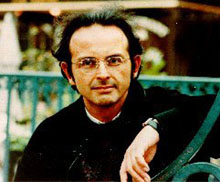"Why
do emergent selves, virtual identities,
pop up all over the place, creating
worlds, whether at the mind/body
level, the cellular level, or the
transorganism level? This phenomenon
is something so productive that
it doesn't cease creating entirely
new realms: life, mind, and societies.
Yet these emergent selves are based
on processes so shifty, so ungrounded,
that we have an apparent paradox
between the solidity of what appears
to show up and its groundlessness.
That, to me, is the key and eternal
question."
FRANCISCO
VARELA (1946 - 2001)

FRANCISCO
VARELA
The Emergent Self
[6.5.01]
Francisco
Varela died on May 28 at his home
in Paris. According to his friend
and collaborator Evan Thompson "I
am told he died completely calm
and at peace. I spent several days
last week with him and his family.
I will always cherish the strength
of spirit, intelligence, and kindness
he continued to manifest in his
last days, despite his illness.
He will be deeply missed."
Francisco,
an experimental and theoretical
biologist, studied what he termed
"emergent selves" or "virtual
identities." His was an immanent
view of reality, based on metaphors
derived from self-organization and
Buddhist-inspired epistemology rather
than on those derived from engineering
and information science. He presented
a challenge to the traditional AI
view that the world exists independently
of the organism, whose task is to
make an accurate model of that world
— to "consult" before
acting. His nonrepresentationalist
world — or perhaps "world-as-experienced"
— has no independent existence
but is itself a product of interactions
between organisms and environment.
He first became known for his theory
of autopoiesis ("self production"),
which is concerned with the active
self-maintenance of living systems
whose identities remain constant
while their components continually
change. Varela is tough to categorize.
He was a neuroscientist who became
an immunologist. He was well informed
about cognitive science and was
a radical critic of it, because
he was a believer in "emergence"
— not the vitalist idea promulgated
in the 1920s (that of a magical
property that emerges inexplicably
from lower mechanical operations)
but the idea that the whole appears
as a result of the dynamics of its
component parts. He thought that
classic computationalist cognitive
science is too simplemindedly mechanistic.
He was knowledgeable and romantic
at the same time.
In
1995 I talked to Francisco for my
book The
Third Culture (Simon
& Schuster, 1995. Speaking about
Varela in the book, theoretical
biologist Stuart Kauffman noted
that "Francisco Varela is amazingly
inventive, freewheeling, and creative.
There's a lot of depth in what he
and Humberto Maturana have said.
Conversely, from the point of view
of a tied-down molecular biologist,
this is all airy-fairy, flaky stuff.
Thus there's the mixed response.
That part of me that's tough-minded
and critical is questioning, but
the other part of me has cottoned
on to the recent stuff he's doing
on self- representation in immune
networks. I love it."
To
remember and honor Francisco, to
think about his ideas, I present
"The Emergent Self", Chapter
12 in The
Third Culture. Included
in the chapter are commentaries
on Francisco and his work by Stuart
Kauffman, W. Daniel Hillis, Christopher
G, Langton, Daniel C.Dennett, Niles
Eldredge, Brian Goodwin, and Lynn
Margulis.
—
JB
FRANCISCO
VARELA was a biologist;
director of research at the Centre
National de Recherche Scientifique,
and professor of cognitive science
and epistemology at the École
Polytechnique, in Paris; author
of Principles of Biological Autonomy;
coauthor with Humberto D. Maturana
of Autopoiesis and Cognition:
The Realization of the Living
and The Tree of Knowledge,
and with Evan Thompson and Eleanor
Rosch of The Embodied Mind
.
Click
Here for Francisco Varela's Bio
Page
for Francisco Varela's Edge bio
page
FRANCISCO
VARELA
The Emergent Self
[Chapter
12 in The
Third Culture
by John Brockman]

FRANCISCO
VARELA: I guess I've had only
one question all my life. Why
do emergent selves, virtual identities,
pop up all over the place creating
worlds, whether at the mind/body
level, the cellular level, or
the transorganism level? This
phenomenon is something so productive
that it doesn't cease creating
entirely new realms: life, mind,
and societies. Yet these emergent
selves are based on processes
so shifty, so ungrounded, that
we have an apparent paradox between
the solidity of what appears to
show up and its groundlessness.
That, to me, is a key and eternal
question.
As a consequence, I'm interested
in the nervous system, cognitive
science, and immunology, because
they concern the processes that
can answer the question of what
biological identity is. How can
you have some kind of identity
that simultaneously allows you
to know something, allows cells
to configure their own relevant
world, the immune system to generate
the identity of our body in its
own way, and the brain to be the
basis for a mind, a cognitive
identity? All these mechanisms
share a common theme.
[continued...]